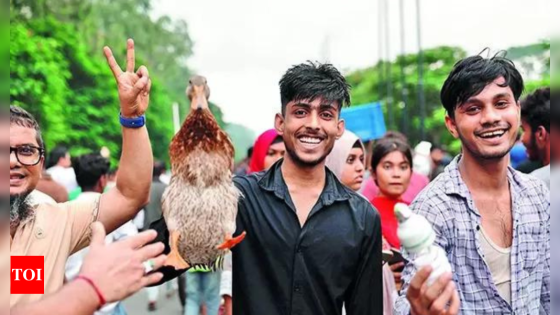Sheikh Hasina‘s flight on Monday left India’s neighbour oscillating between hope and apprehension, the unbridled joy and relief experienced by the millions who hit the streets contrasting with the uncertainty about the new future expressed by those who chose to stay away from the anti-govt protests.
Filmmaker Kamar Ahmad Simon was part of the Long March programme on Monday.”Hasina’s tragic journey is one of immense personal sacrifice for the people but it culminated in a regime marked by kleptocracy and oligarchy,” he said. His son, Rishov Aditya (21), too has been part of the protests. He took to social media to quote Faiz Ahmed Fazi’s “Hum Dekhenge” immediately after the army takeover. “I tried to translate it Sunday night when all hope seemed lost. But today, it seems we can dare to hope again,” he posted.
Director Mostofa Sarwar Farooki said people were witness to such a stir in 1971. “Students of political science can use this as a case study of how the Father of the Nation’s daughter can turn into the worst and cruellest fascist of the world,” he said. “I salute the students who transcended the Bangla-English-Arabic medium and Hindu-Muslim-Buddhist barriers. The most useful posters of this movement were made by Debasish Chakraborty,” he added.
But Dhaka-based writer Souradeep Dasgupta was a bit apprehensive. “I am sceptical about the future. We have a tendency for binary views and anarchy could be the end result in a country steeped in extremism,” he said.
Actor Rafiath Rashid Mithila appeared to be talking on behalf of many when she posted on FB: “Random young men stopped my car twice on my way home and asked me to open the trunk. When this happened for the third time, I asked why they were doing this. They told me aggressively they were checking whether there was any Awami League (worker) in the car. We do not want total anarchy. We do not support vandalism. The students did not fight for this. We want peace and safety.”
Filmmaker Kamar Ahmad Simon was part of the Long March programme on Monday.”Hasina’s tragic journey is one of immense personal sacrifice for the people but it culminated in a regime marked by kleptocracy and oligarchy,” he said. His son, Rishov Aditya (21), too has been part of the protests. He took to social media to quote Faiz Ahmed Fazi’s “Hum Dekhenge” immediately after the army takeover. “I tried to translate it Sunday night when all hope seemed lost. But today, it seems we can dare to hope again,” he posted.
Director Mostofa Sarwar Farooki said people were witness to such a stir in 1971. “Students of political science can use this as a case study of how the Father of the Nation’s daughter can turn into the worst and cruellest fascist of the world,” he said. “I salute the students who transcended the Bangla-English-Arabic medium and Hindu-Muslim-Buddhist barriers. The most useful posters of this movement were made by Debasish Chakraborty,” he added.
But Dhaka-based writer Souradeep Dasgupta was a bit apprehensive. “I am sceptical about the future. We have a tendency for binary views and anarchy could be the end result in a country steeped in extremism,” he said.
Actor Rafiath Rashid Mithila appeared to be talking on behalf of many when she posted on FB: “Random young men stopped my car twice on my way home and asked me to open the trunk. When this happened for the third time, I asked why they were doing this. They told me aggressively they were checking whether there was any Awami League (worker) in the car. We do not want total anarchy. We do not support vandalism. The students did not fight for this. We want peace and safety.”
Source Agencies

